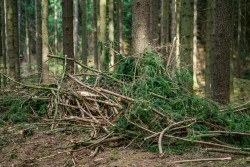Press Release: The Rehap project uncovers agroforestry residue potential in Europe as the EIB pledges a €1bn investment in the bio-economy
The investment from the European Investment Bank (EIB) has been seen as a valuable lifeline to those sectors encompassing the bio-economy. The initiative also provides a much-needed boost in confidence for and recognition of the future growth in Europe’s rural economy, which supplies much of the material for the development of biomass for biomaterials. This investment is expected to strengthen the competitiveness of European companies active in the bio-economy and agriculture by improving their long-term success in developing and marketing higher added value products and services. Rehap is an EU-funded project whose recent studies have come at an ideal time, adding more fuel to the fire that is Europe’s rural economy. With little or no research available for the determination of the potential of agroforestry waste in the EU-28, Rehap partner the University of Augsburg aimed to forecast the amount of residue that can be technically, legally and sustainably removed from the field or forest for use in bio-economy advances, and it has made some groundbreaking findings: • Agriculture waste: Wheat straw had the highest bio-economical potential with a high lignocellulose feedstock content of approximately 49 Mt out of 96 Mt of total straw available. Maize stover and barley straw were also in significant quantities. Currently, less than 8% of the theoretical potential of straw is recovered from fields. The region Bassin Parisien is the most promising region for gathering this agriculture residue across the EU-28 countries at 6,848t. • Forestry waste: Bark from conifers, in particular pine and spruce, is the most promising source for lignocellulose feedstock and is in high availability, accumulating in large amounts in sawmills and pulp mills. The best location for highest yield was found in the regions of Manner-Suomi, Finland at 2,111t and Södra-Sverige, Sweden at 1,343t. The project has discovered where in Europe this waste is prevalent and how much of these off-cuttings from forestry and agriculture is actually waste and can be used for bio-based materials and energy without impacting negatively on the ecosystem. This research is vital in helping to meet the challenge raised by the severe ecological and ethical concerns of using too much waste or misusing biomass. When using biomass that competes with food production, crop cultivation, animal bedding and other industrial-scale production, for example, will put a strain on the environment and negatively affect humans, animals and plants. With its results, Rehap has shown that the abundant supply of agroforestry waste goes hand-in-hand with the EIB investment, which is available for new businesses in the bio-economy and agricultural sectors to start using and innovating new products and techniques. Rehap is an already well-established EU-funded project, championing the bio-economy and agriculture research in the EU. The project aims to create new products that can be used to make eco-friendly resins for wood and bio-based chemicals for greener cement. The project has been focusing on lignin, tannin and cellulose, essential for the design of biopolymers, which are first extracted before they are transformed via pioneering new processes to create artificial chemicals that are commonly used in the construction industry, normally derived from fossil fuels. The recent Rehap paper 'Assessment of agroforestry residue potentials for the bioeconomy in the European Union', published in the Journal of Cleaner Production, reviews in detail the potential of agroforestry residues. This new data highlights the high stability and reliability of these residues in the EU and justifies the strength of these results for a sustainable European bio-economy. Discovering this ample supply of agroforestry waste offers an even greater opportunity to those looking to invest in the sector to drastically change Europe’s rural economy, and the planet for the better.
Countries
Belgium, Germany, Spain, Finland, Italy, United Kingdom



